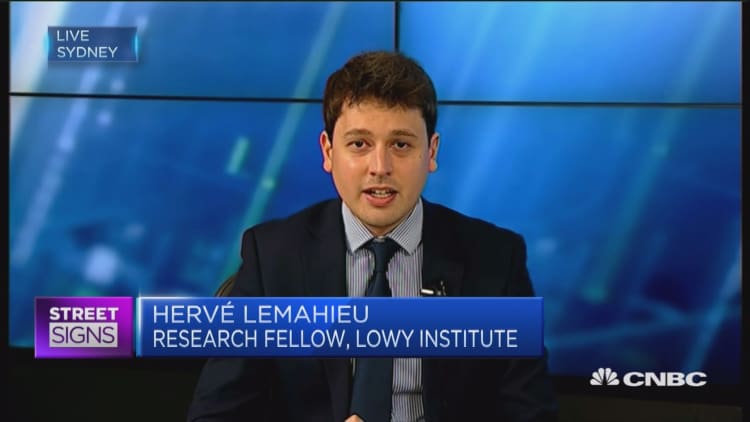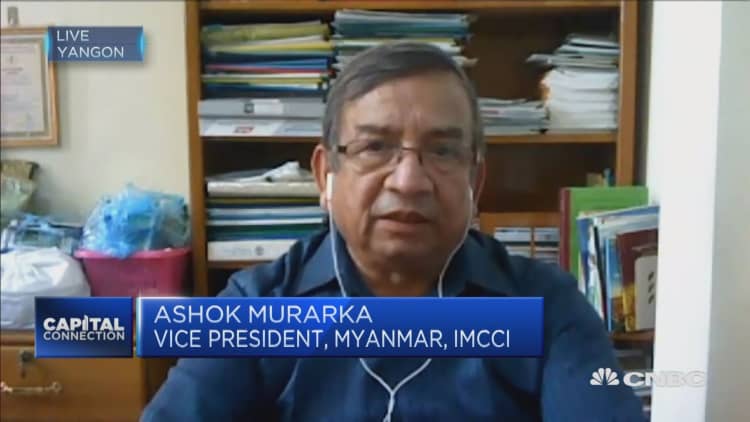
Myanmar finds itself increasingly isolated diplomatically as violence against the country's Muslim minority Rohingya spurs a humanitarian crisis, but an analyst said the country has found one prominent ally: India.
Over the weekend, the United Nations appealed for aid as the number of Rohingya fleeing into southern Bangladesh neared 300,000 after the upsurge of violence began in Myanmar on August 25, Reuters reported.
Thousands of homes were burned down and dozens of villages destroyed in Myanmar's Rakhine state after Rohingya insurgent attacks on police posts and an army base spurring a military counter-offensive, the report said.
The worsening of the Rohingya crisis coincided with the third day of Indian Prime Minister Narendra Modi's first bilateral visit to Myanmar.
Earlier in his visit, Modi stated that India and Myanmar shared "similar security interests in the region," including concern over "extremist violence" in the Rakhine state.
His statement followed the Indian government's decision to expel 40,000 Rohingya from India.
Herve Lemahieu, of Australian foreign policy think tank Lowy Institute, said that showed Modi, and Myanmar's State Councilor Aung San Suu Kyi had an "alignment of world views."
Both understand the Rohingya situation through the lens of "state sovereignty and state security," he told CNBC's "Street Signs" last week.
If state sovereignty and security are perceived to be threatened by "what they call the Rohingya insurgency," then Modi is complicit in "Suu Kyi's approach not to call out on the military's abuses of power in the Rakhine state," he said.
The predominantly Buddhist country's treatment of the Rohingya has long been a point of contention and attacks on the Muslim minority have been reported for months prior to the recent intensification.
Rights monitors and fleeing Rohingya have said the minority has faced a campaign of arson aimed at driving them out of the country, Reuters reported.
Aung San Suu Kyi, who won the Nobel peace prize in 1991 amid her efforts to return Myanmar to democratic rule, has faced increasing condemnation for her lack of action on protecting the Rohingya. She instead reportedly referred to reports of violence as an "iceberg of misinformation."
India's Ministry of External Affairs and Myanmar's Ministry of Foreign Affairs didn't immediately return CNBC's request for comment.
Lemahieu said that Modi's comments on the Rohingya crisis would offer Myanmar some respite from condemnation as a possible U.N. Security Council Censure loomed.
Modi's visit aimed to boost economic ties between the two countries, Lemahieu said.
India has been playing a "catch-up game" with China as the subcontinent has lagged in investment and trade relations with Myanmar.
The subcontinent's bilateral relationship with Myanmar is especially important as part of the Indian government's "Look East Policy," which aimed to use Myanmar as a springboard for reaching out to Southeast Asia.

But those ties could be strained as the escalation of the Rohingya situation threatens the continuity of the Kaladan Multi-Modal Transit Transport Project, which has been delayed several times since 2013.
This project was among the "crucial pieces of infrastructure" and was strategic in furthering relations between the two countries, Lemahieu said.
In addition to shoring up ties with India, Myanmar has begun talks with China and Russia to block any U.N. Security Council decision on the ongoing Rohingya crisis, Reuters reported last week.
On Sunday, the Arakan Rohingya Salvation Army insurgents declared a temporary ceasefire, but Myanmar has yet to issue a formal response, Reuters reported.
Lemahieu noted that Myanmar's approach to the Rohingya crisis was fraught with contradictions.
In a press conference last week, Myanmar's National Security Advisor, Thaung Tun, responded to allegations of violence against and mistreatment of the Rohingya, by saying that the minority should bring their grievances to court and "provide proof that this was done."
Lemahieu noted that this approach appeared to indicate the government was portraying the crisis as a "law and order" issue that could be resolved through legal means, rather than "communal violence that has logic of its own on the ground."

